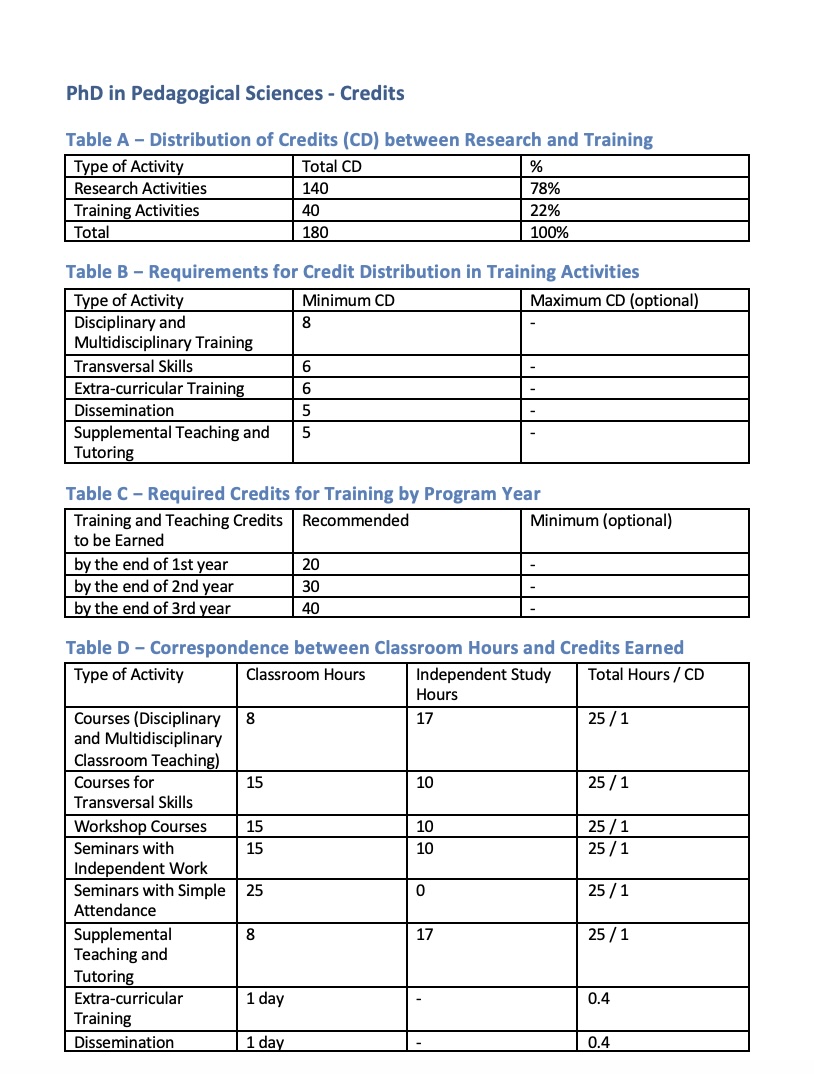Training program
Description of the PhD Program Activities in Educational Sciences
The overall objectives of the training program pertain to its two main tracks: the historical-pedagogical and the experimental-didactic.
The 1st year focuses on developing knowledge of educational fields and research methodologies, covering the following areas:
- General and Social Pedagogy: includes philosophy of education, family pedagogy, intercultural pedagogy, and adult education;
- History of Pedagogy: includes the history of schooling, history of education, history of childhood theories, history of children’s imagination, and children's literature;
- Didactics and Special Pedagogy: includes teaching and learning methodologies, inclusive education, special educational needs, educational technologies, and e-learning;
- Experimental Pedagogy: includes theories and strategies for designing and evaluating educational interventions, educational measurement, and empirical research methods in education.
Cross-cutting objectives focus on the primary methods of empirical research in education, achieved through seminars and individual study on research methodologies, following a curated bibliography of qualitative and quantitative research texts and articles.
Additional seminars delve into specific topics in Educational Sciences (Psychology, Anthropology, Sociology, etc.).
The 2nd year of training has two phases:
- International Seminars: Seminars by foreign faculty (including committee members from international universities) aim to broaden scientific and methodological perspectives, foster transnational dialogue, and lay the groundwork for international research experiences.
- Research Project Development and Critique: A cycle of seminars and exercises centers on presenting research projects, with discussants providing methodological feedback to support students in finalizing their research design, structure, and initial results. Objectives include discussing research design with an emphasis on alignment between goals and methods, study feasibility, public presentation skills, and effective responses to feedback—an essential skill in scientific work.
The goal of the 3rd year is to complete the personal research project and the dissertation, guided by the tutor and co-tutor. This includes methodological support meetings and sessions with faculty from other Italian and international universities. Doctoral candidates also participate in conferences and seminars to present their research designs and preliminary findings to the academic community.
An integral component of the third-year training is the “Research in Progress” event, a seminar where doctoral candidates, under the faculty’s supervision, organize and present their research to an audience of Italian and international scholars invited as discussants.
This set of educational experiences equips PhD graduates with skills that enable them to assume expert roles in educational and training processes at advanced levels, both in academic research and in diverse educational and training institutions.
Learning Objectives of the PhD Program in Educational Sciences
1st Year
Focus on Foundational Disciplines and Research Methodology
- General and Social Pedagogy
- Philosophy of education
- Family pedagogy
- Intercultural pedagogy
- Adult education
- History of Pedagogy
- History of schooling
- History of education
- History of childhood theories
- History of children's imagination
- Children's literature
- Didactics and Special Pedagogy
- Teaching and learning methodologies
- Inclusive education
- Special educational needs
- Educational technology and e-learning
- Experimental Pedagogy
- Theories and strategies for designing and evaluating educational interventions
- Educational measurement
- Empirical research methods in education
Interdisciplinary exploration with themes from other Educational Sciences (Psychology, Anthropology, Sociology), with emphasis on research methodology.
2nd Year
International and Methodological Seminars
- Part One: International seminars to broaden scientific and methodological perspectives, and support in designing research projects and writing scientific results.
- Part Two: Project presentation sessions with discussants providing methodological feedback, supporting critical analysis and refinement of research projects.
3rd Year
Personal Research and Dissemination of Results
- Conducting Personal Research
- Supervised by the primary tutor and co-tutor
- Collaboration with faculty from other Italian and international universities
- Presenting Research
- Participation in seminars and conferences to present research designs and preliminary results
- Organization of the “Research in Progress” seminar, where doctoral students present their work to a diverse academic audience invited as discussants.
Final Learning Outcomes
- Advanced Research Competencies
- Contribute significantly to scientific knowledge in education
- Demonstrate critical analysis and synthesis of major educational theories and practices
- Expertise in designing and evaluating evidence-based educational interventions
- Skillfully present and discuss research findings, responding effectively to feedback
- Professional Roles
- Ability to assume expert roles in educational and training processes at advanced levels
- Contribution to academic research and educational institutions and services
